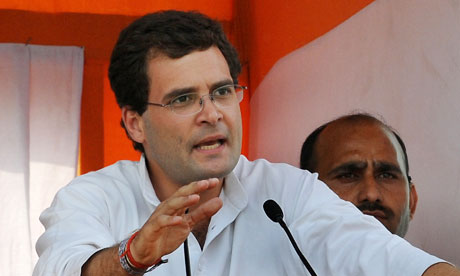
Rahul Gandhi has been appointed by his mother Sonia to a committee looking after the affairs of India's ruling Congress party. Photograph: Raveendran/APP/QUETTA
Rahul Gandhi, the crown prince of Indian politics, took a step nearer to power on Thursday when it was announced that his mother Sonia, the leader of the ruling Congress party, had suddenly gone abroad for medical reasons and charged the 41-year-old with running the organisation in her absence.
The country immediately plunged into a frenzy of speculation about the nature of the 64-year-old Sonia Gandhi's condition and whether her departure meant the beginning of the long awaited transfer of power to her son.
Though Gandhi holds no official executive position, she is widely viewed as immensely powerful. Her son is a member of parliament and head of the Congress party's youth wing, which has run India for much of the last seven decades. Along with a senior aide, a party spokesman and the current defence minister, Rahul Gandhi will now be temporarily responsible for the administration of the single most powerful entity in Indian politics.
"Rahul in charge" was the headline running on the local New Delhi television channel.
Janardhan Dwivedi, who will sit with Rahul on the committee, said Sonia Gandhi had been recently diagnosed with a medical condition and, on the advice of her doctors, had travelled abroad for surgery.
"She will be away for two or three weeks. She has constituted a group to look after party affairs in her absence," Diwedi said.
Her son is a controversial figure in India. He never gives interviews and shuns the febrile Indian political media circuit, preferring to build a political career through his work as a party organiser and through spectacular public appearances which opponents dismiss as stunts.
In recent months Rahul Gandhi has been arrested after driving on a motorbike around communities of farmers protesting against land seizures on the outskirts of Delhi and walked 50 miles over four days in the summer heat in a remote part of northern India on a trip to "meet the real people" of India. He slept and ate in modest homes.
On a recent visit to Mumbai, Gandhi outmanoeuvred local rightwing groups who opposed his presence in the city by shunning the large and disruptive motorcade preferred by Indian politicians in favour of the overcrowded public trains to reach the city from the airport.
Such actions have successfully raised Gandhi's profile and appear to have consolidated popular support among rural voters, a key constituency for Congress.
Tikam Singh, a 40-year-old farmer from the village of Gujran Atta, Uttar Pradesh, met Gandhi earlier this summer during the violent land protests. Singh said the politician "understood that the lands are being taken away forcibly".
"He has said that he is with us. He shared roti [bread] and daal [lentil curry] with us. We are with him because at least he is someone who is there for us. Rahul-ji was very understanding," Singh said, using the honorific "ji" after Gandhi's first name.
However, Siddharth Varadarajan, editor of The Hindu, said that the real importance was not that Rahul Gandhi had been nominated but that Sonia Gandhi might be ailing.
"The timing of this announcement means she is telling us whose hands she wants the party to be in should she be no longer in a position to run things," he said.
Some analysts have even raised the possibility that Sonia Gandhi might not return to politics, though Congress party officials said there was "totally, absolutely no question" of any immediate retirement.
Rahul Gandhi is the great-grandson of Jawaharlal Nehru, who led India after independence, the grandson of Indira Gandhi, who ruled India from 1966 to 1977, and the son of former prime minister Rajiv Gandhi, who was killed by a suicide bomber in 1991. His parents met at Cambridge University.
Politics in India remains deeply dynastic and many within Congress view Rahul Gandhi as the only figure capable of leading the party to a third successive electoral victory in 2014. The current administration, under the ageing Manmohan Singh, has been overwhelmed by corruption scandals and increasing economic problems.





 11:12 AM
11:12 AM
 Humari news
Humari news


 Films, one of the best production house in India. MBKD’s starcast includes Katrina Kaif & Imran Khan. It’s a romantic-comedy film, directed by Ali Abbas Zafar. This movie is undoubtedly going to be a huge-hit because of its good starcast. John Abraham will also be doing an special appearance in this movie.
Films, one of the best production house in India. MBKD’s starcast includes Katrina Kaif & Imran Khan. It’s a romantic-comedy film, directed by Ali Abbas Zafar. This movie is undoubtedly going to be a huge-hit because of its good starcast. John Abraham will also be doing an special appearance in this movie.











